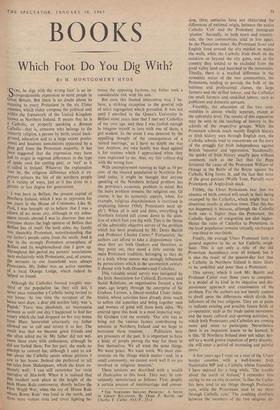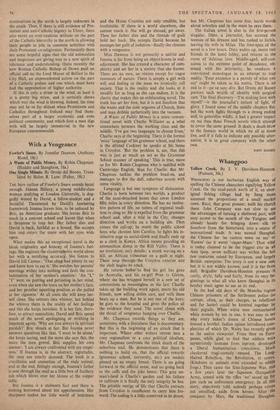BOOKS
Which Foot Do You Dig With?
Y H. MONTGOMERY HYDE
`CI LIRE, he digs with the wrong foot' is an in-
comprehensible expression to most people in Great Britain. But there is no doubt about its meaning to every Protestant in the six Ulster counties, which today compose the political unit within the framework of the United Kingdom known as Northern Ireland. It means that he is a Catholic, or properly speaking a Roman Catholic—that is, someone who belongs to the minority religion, a person by birth, social back- ground, education and to a large extent profes- sional and business associations separated by a deep gulf from the Protestant majority. It has had suggested that the expression may have had its origin in regional differences in the type of spade used for cutting peat, or 'turf' as it is called in Ireland. Whatever the explanation may be, the religious difference which it ex- presses colours the life of the northern people 011 a variety of ways, just as it has done in a greater or less degree for generations.
I was born in Belfast, the present capital of Northern Ireland, which I was to represent for ten years in the House of Commons. Like St. PAUL I was brought up to believe that 1 was a citizen of no mean city, although in my subse- quent travels abroad I was 'to discover that not everyone shares the high opinion of Belfast that Belfast has of itself. On both sides, my family was staunchly Protestant, notwithstanding that mY father's people came from the south. And it was in the strongly Protestant atmosphere of Belfast and its neighbourhood that I grew up. 'throughout this ,period my parents' associations were exclusively with Protestants, and, of course, the servants in our household were always Protestants. My father was an active member of a local Orange Lodge, which indeed he helped to found.
Although the Catholics formed roughly one- third of the population (as they still do), I never once remember a Catholic being invited to our house. At one time the occupant of the house next door, a dear old maiden lady, was 'a Papish.' There was absolutely no intercourse between us until one day I happened to find her rosary which she had dropped on her way home from Mass. Somewhat reluctantly my father allowed me to call and return it to her. The result was that we became great friends and she often asked me in. My father did not wel- come these visits with enthusiasm, although he did not forbid them. For her part, she made no attempt to convert me, although I used to ask her about the Catholic saints whose pictures I saw in her house. Instead she preferred to tell me tales from Shakespeare, which she knew ex- tremely well: I can still remember her vivid narrative of Macbeth. When it is realised that this incident took place at the height of the Irish Home Rule controversy, shortly before the First World War, when the cry of 'Home Rule means Rome Rule' was loud in the north, and there were violent riots and street fighting be-
tween the opposing factions, my father took a considerable risk with his son.
But even this limited intercourse was, I be- lieve, a striking exception to the general rule of strict segregation which prevailed. It was not until I enrolled in the Queen's University in Belfast some years later that I met any Catholics of my own age, and then I was foolish enough to iniagine myself in love with one of them, a girl student. In the event I was deterred by the appalling thought of the consequences of a `mixed marriage,' as I have no doubt she was too. Anyhow, my own family was dead against it for reasons which I appreciated when they were explained to me. Alai, my fair colleen dug with the wrong foot.
With unemployment running as high as 10 per cent. of the insured population in Northern Ire- land today, it might be thought that anyone speaking of the Northern Ireland problem has the province's economic problem in mind. But the main problem remains the religious one. Of course, it has its economic aspects, when, for example, religious discrimination is exercised in employing labour (*Only Protestants need ap- ply'). When all is said and done, everything in Northern Ireland still comes down to the ques- tion of which foot you dig with. This is the theme of the admirably objective survey of the problem which has been produced by Mr. Denis Barritt and Professor Charles Carter.* Fortunately the authors can afford to take a dispassionate view, since they are both Quakers and therefore, as they point out, they stand a little outside the main Protestant tradition, belonging as they do to a body whose nature was strongly influenced by persecutions which in the seventeenth century it shared with both Dissenters.and Catholics.
This valuable social survey was instigated by the Irish Association for Cultural, Economic and Social Relations, an organisation formed a few years ago largely through the enterprise of Sir Graham Larmor, a liberal-minded Ulster indus- trialist, whose activities have already done much to soften old asperities and bring together men and women of gobd will from both sides. We entered upon this book in a most impartial way,' Sir Graham told me recently. `Our aim was to bring out the various factors contributing to , tensions in Northern Ireland and we hope to overcome these tensions„ . „ Politicians here are prisoners of the past. It is important to have a body of people paving the way for them to free themselves, We all want the same things. We want peace. We want work. We must con- centrate on the things which matter—and, in a small community, we cannot work well if we are involved in religious tensions.'
These tensions are described with a wealth of illustration in this book. They may be con- veniently summarised as follows. First, despite a certain amount of intermarriage and conver-
* THE NORTHERN IRELAND PROBLEM: A STUDY IN GROUP RELATIONS. By Denis P. Barritt and Charles F. Carter. (O.U.P., 25s.) sion, three centuries have not obliterated the differences of national origin, between the native Catholic 'Celt' and the Protestant immigrant 'planter.' Secondly, in both town and country- side, the two communities tend to live apart. In the Plantation times, the Protestant Scots and English lived around the city market or within the walls, while the Catholic Irish dwelt on the outskirts or beyond the city gates, and in the country they tended to be excluded from the good valley land and banished to the mountains. Thirdly, there is a marked difference in the economic status of the two communities, the Protestants tending to provide the bulk of the business and professional classes, the large farmers and the skilled labour, and the. Catholics the small farmers and unskilled labour, such as publicans and domestic servants.
Fourthly, the education of the two com- munities is almost wholly separate, except at the university level. The results of this separation may be seen in the teaching of history in the schools of the respective groups. While the Protestant schools teach mainly English history or Irish history seen through English eyes, the Catholic schools tend to concentrate on the story of the struggle for Irish independence against British 'injustice' and 'oppression.' Incidentally, the quirks of Irish history usually pass without comment, such as the fact that the Pope favoured the cause of the. Protestant William of Orange at the Battle of the Boyne against the Catholic King James II, and the fact that most of the great patriots (Wolfe Tone, Parnell) were Protestants of Anglo-Irish stock.
Fifthly, the Ulster Protestants fear that the absence of birth control will result in their being swamped by the Catholics,. which might lead to disastrous results at election times. That this has not happened is because, although the Catholic birth rate is higher than the Protestant, the Catholic figures of emigration are also higher. Hence the ratio of Catholics to Protestants in the local population remains virtually unchanged -- one-third to two-thirds.
Finally, the average Ulster Protestant feels in general superior- to his or her Catholic neigh- bour. This is not only a relic of the old Protestant Ascendancy over all Ireland, but it is also the result of the present-day fact that a Catholic in Northern Ireland is more likely to be unskilled and poor than a Protestant.
This survey, which it took Mr. Barritt and Professor Carter over three years to complete, is a model of its kind in its objective and dis- passionate approach and examination of the problem. For the authors are not merely content to dwell upon the differences which divide the followers of the two religions. They are at pains to indicate existing and possible future fields of co-operation, such as the trade union movement and the many cultural and sporting activities, in which both Protestants and Catholics are coming more and more to participate. Nevertheless there is an important lesson to be learned. It is this. 'If Northern Ireland does not adapt her- self to a world grown impatient of petty disunity, she will enter a period of increasing and painful stress.'
A few years ago I went on a tour of the Ulster border counties with a well-known Irish Nationalist MP and a Catholic whose friendship I have enjoyed for a long while. 'The trouble about the north of Ireland,' I remember him saying to me on this occasion, 'is that the Catho- lics here tend to see things through Protestant eyes, .while the Protestants tend to see them through Catholic eyes.' The resulting aloofness between the members of the two religious de-
nominations in the north is largely unknown in the south. Thus, if there is still evidence of Pro- testant and anti-Catholic bigotry in Ulster, there also exists an over-cautious attitude on the part of the Catholic hierarchy in the north in allowing their people to join in common activities with their- Protestant co-religionists. Fortunately there are some hopeful signs that the old animosities and suspicions are giving way to a new spirit of tolerance and understanding. Quite recently the new Roman Catholic Bishop of Down paid an official call on the Lord Mayor of Belfast in the City Hall, an unprecedented action on the part of a Catholic prelate and one which must have had the approbation of higher authority.
If this is only a straw in the wind, at least it is a pretty big straw, and it certainly shows which way the wind is blowing. Indeed, the time may not be so far distant when Protestants and Catholics throughout Ireland may find them- selves part of a larger economic and even political community, and which foot a man digs with will be largely immaterial in the new European commonwealth.































 Previous page
Previous page